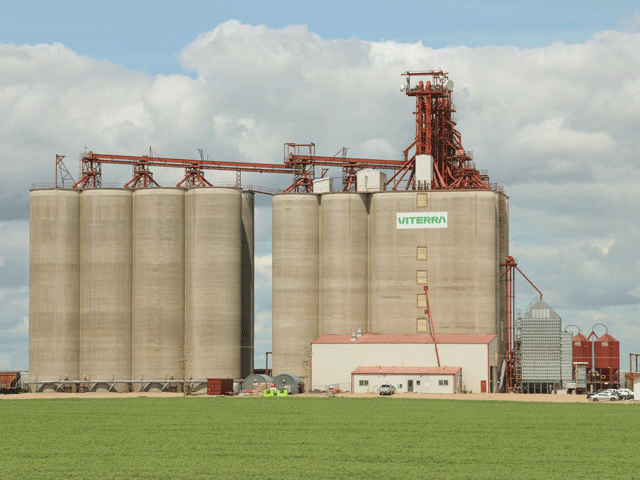GSU Members Accept Latest Viterra Offer
Viterra Canada and GSU Ratify Agreement and Avoid Strike
OMAHA (DTN) -- Viterra Canada and the Grain and General Services Union (GSU) both announced union members have accepted a final contract offer from Viterra, although the union noted "the result does not show overwhelming support for the final offer."
On Jan. 2, the union, representing 436 members of GSU Local 1 (Viterra Country Operations and Maintenance) and Local 2 (Viterra Regina Head Office in Regina, Saskatchewan), issued a 72-hour strike notice to Viterra Canada Inc. and the Federal Minister of Labour, Hon. Seamus O'Regan, of their intent to strike as early as the afternoon of Jan. 5. Late Jan. 4, Viterra offered a new final offer, leading the union to suspend its strike action and allow its union members to vote on the offer.
Votes followed in the days after and were counted Jan. 19, resulting in the announcement that the offer was accepted.
For ag producers, there's relief a strike was averted.
"Producers may have dodged a bullet with a strike avoided, although Viterra claimed they did have a plan in the event of a work stoppage," said DTN Canadian Grains Analyst Cliff Jamieson.
"Industry data shows a recent sharp decline in West Coast unloads due to the recent extreme cold weather pattern across the Prairies, along with a sharp rise in the number of cars sitting idle, and further disruptions of any kind are simply not needed," Jamieson said.
FINAL OFFER INCLUDED SALARY INCREASES
P[L1] D[0x0] M[300x250] OOP[F] ADUNIT[] T[]
The company's final offer included a four-year agreement, with overall salary increases of 4.5% in year one (retroactive to Jan. 1, 2023), 3.75% in year two, and 2.5% in years three and four. Viterra, in its news release, stated, "This four-year agreement recognizes an employee's individual contributions in the company's pay-for-performance compensation structure, which includes continued eligibility for an annual bonus payment under the company's Short-Term Incentive Plan."
"We're very pleased to have reached a long-term agreement with our employees, one that we believe is fair and reasonable that takes into account their needs while balancing the needs of our business through long-term labor stability," said Jordan Jakubowski, VP of human resources for Viterra Canada.
In total, Viterra has 17,500 employees in 37 countries. In the two locals involved in recent contract negotiations, representing 436 members, Local 1 voted 63% to accept the new contract, and Local 2 voted 68% in favor.
"This offer was accepted by the majority of members of both Locals, but members still have their sights set on more improvements next time," said Steve Torgerson, bargaining spokesperson and GSU general secretary. "It is important to point out that there are improvements gained in this deal. Improvements we have been working on for years. Improvements that will benefit members today and in years to come."
OTHER LABOR UNREST CONTINUES
While this labor contract may have been settled, farmers will keep a close eye on other possible labor unrest that could affect them.
Jamieson recently noted that the Port of Montreal workers may be on the verge of a strike. A strike would affect farmers shipping east: A Transport Canada study in 2021 found a five-day strike at Port of Montreal could cost up to $100 million per week, with the value of total shipments estimated to be roughly one-third of West Coast shipments.
The port's website said Viterra grain terminal has a capacity of 260,000 metric tons (mt). The 2022 annual report shows 36 million metric tons (mmt) of product handled at the port, of which 8.2 mmt is dry bulk commodities and 14.4 mmt is containterized. The dry bulk includes grains, including soybeans, wheat, barley, corn, canola and rye and more, along with iron ore, sugar, salt, fertilizer, gypsum and gravel.
Jamieson noted that, in mid-December, contract talks between longshore workers and employers at the Port of Montreal broke down, with the previous contract to end Dec. 31, 2023. Shippers have asked the federal government to intervene to declare terminal activity an essential service, while unions feel that the 72-hour notice before a strike is sufficient and allows vessels to divert to another port.
Following a "cooling-off" period, workers have been in a position to strike since Jan. 4, 2024, provided 72-hour notice is given. It is reported that longshoremen want a wage hike of a minimum of 20% over four years and job security after three years.
"There does seem to be a trend towards increased labor unrest across many industries and 2024 could see more labor issues facing agriculture," Jamieson said.
(See "Canada May Face Another Port Strike," at https://www.dtnpf.com/…)
Elaine Shein can be reached at elaine.shein@dtn.com.
Follow her on X, formerly known as Twitter, @elaineshein.
(c) Copyright 2024 DTN, LLC. All rights reserved.




